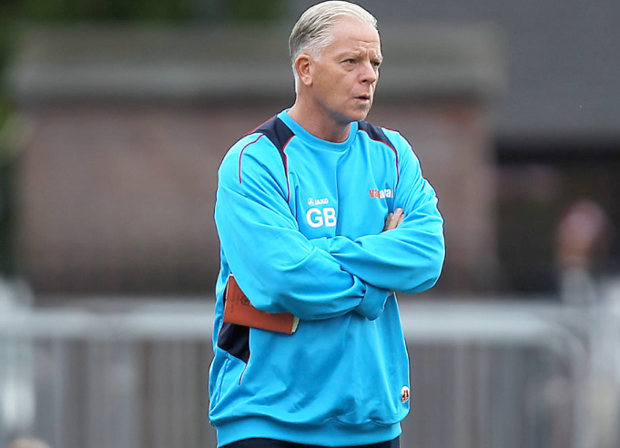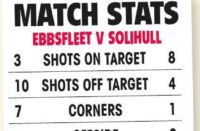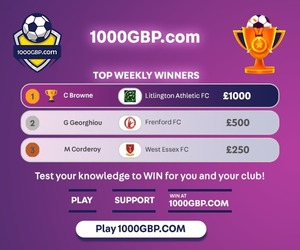Catch up on The Non-League Paper’s new Non-League Icons series as Chris Dunlavy discovers what made legendary manager Gordon Bartlett so special and a father figure to so many…
Gordon Bartlett was a mere 90 minutes into his new job as Wealdstone manager when the doubts set in. It was August 1995, and the Stones had just thumped Cove 9-1 on the road. Yet Bartlett, who had ditched a safe post at second-tier Yeading, knew the dream debut masked a bleak reality.
Homeless. Penniless. Clogged by administration with just two players on the books. Ten years after clinching an Alliance Premier and FA Trophy double, the Ruislip outfit were starting from scratch in the Ryman Third Division, watched by crowds of less than 300.
“I was used to competitive football on well prepared pitches and decent facilities,” he recalled in Off the Bench, his 2010 biography. “This was a poor pitch in a run down stadium with small tatty dressing rooms. I thought maybe I had dropped down too far.”
Bartlett, though, would overcome such wobbles to become arguably the greatest manager in Wealdstone’s history, winning three promotions and spending 22 years in the dugout. By the time he stepped down in August 2017, the 64-year-old was the longest serving manager in the top six tiers of English football.
Countless gems were unearthed along the way. Jermaine Beckford, signed by Leeds United for £70,000 in 2006, later played in the Premier League for Everton. Marvin Morgan, Scott Donnelly and many more forged successful EFL careers. According to Scott McGleish, a veteran player who later became part of Wealdstone’s coaching staff, that nose for talent was the cornerstone of Bartlett’s success.
“Gordon’s knowledge of players, especially in the local area, was beyond belief,” says the former Wycombe, Colchester and Leyton Orient striker. “Park football, Essex Senior League, the Championship – it didn’t matter. He knew every kid coming through. It was scary. He must have had four or five black books because he had contacts for just about everybody you can imagine.
“You just need to look at some of the players to see how good his eye was. Even the lads who came on loan from Watford like Britt Assombalonga and John-Joe O’Toole will tell you how much Gordon helped them. Gordon would always say ‘Oh, it’s only because someone gave me his name’. But he was the one who took the chance. He was the one who developed them. It was a great skill.”
Bartlett’s talent-spotting prowess was evident from the start. After a professional career cut short by injury at the age of 22, Bartlett became a full-time PE teacher and took charge at Southall whilst still in his twenties. One of his first signings was Les Ferdinand, a teenage painter and decorator who would go on to become one of the Premier League’s all-time leading scorers.
“Les couldn’t trap a bag of cement in those days and he was crap in the air,” said Paul Sweales, his old strike partner. “But Gordon saw something nobody else did.”
Personable
Southall won a league and cup double that season; Bartlett would later guide Hounslow to their highest finish in 104 years before enjoying a successful stint at Yeading. Wealdstone, meanwhile, were painstakingly hauled from death’s door to the top-half of National South, despite spending 13 years of Bartlett’s reign without a home.
And if recruitment was Bartlett’s core strength, his genial personality wasn’t far behind. “The way he approached players was light years ahead,” says McGleish. “People talk about man-management as a skill but it was second nature to Gordon.
“He was personable, warm, respectful, above anything I ever encountered in the EFL. Over the years he almost grew into a family member for the club, and that’s how he treated everyone who worked there.”
Jonathan North, a former Watford trainee who left Wealdstone in January after ten years between the sticks, concurs. “Because he’d been there so long, every result meant the world to him and that rubbed off on everyone else,” says North.
“It made you care, and it’s why he got results, but, above all, he was just a really good bloke. He cared about you as a person. If you got dropped, he’d explain why. Even when I speak to him now, it’s not about football. It’s ‘How’s the family? How’s the job?’
“He understood what Non-League football is about. He didn’t believe in fining players for missing training. He appreciated that you have a life out of football and didn’t try to impose professional standards.”
Passion
One famous example was that of Vic Schwarz, a Southall striker initially banned from downing his customary pre-match pint. When his form nosedived, Bartlett sent him back to the boozer – and was rewarded with a hat-trick. Such characters, though, are increasingly scarce.
And whilst regime change and poor results were the superficial reasons for Bartlett’s retirement, both McGleish and North suspect professional creep was a more telling factor. “The people at this level have changed,” says North.
“It isn’t lads who’d come along after a day on the building site and play their hearts out for the love of it. It’s people dropping out of the pro game and seeing the club as a stepping stone.
I wouldn’t ever say that Gordon couldn’t have managed those people, or that the game had left him behind. But I don’t think they necessarily shared his passion for the game.”
McGleish adds. “It’s true. When Gordon started it was £30-a-week maximum. By the end, it was ten times that. Easy. I remember him saying to me ‘I’m not used to this money, Scott’.
At the same time, I think it dawned on Gordon just what he’d missed out on over the years. His mum wasn’t well. His dad passed away. He’d been on one holiday in about 15 years. He realised it was time to take a step back and stop devoting himself to football. And why shouldn’t he? “There can’t be many people who’ve given more to the game than him.”
Make sure you get your copy of The Non-League Paper this weekend for more great features and all the latest news in one place on the impact of the coronavirus crisis on society and football.
In shops on Sundays and Mondays, The NLP is always available as a pound-busting digital edition and full replica of the printed paper from midnight on Saturdays. Save cash on single issues, even more on longer deals and the pages still rustle too!
Images courtesy of The Non-League Paper
























